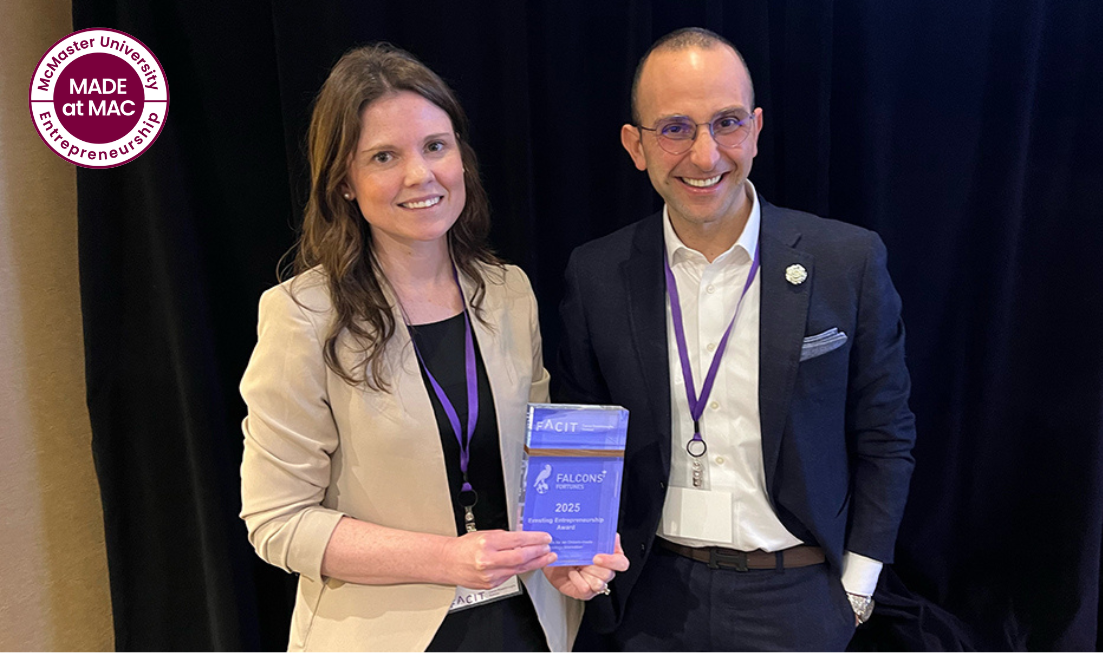McMaster startup NodeAI delivers more accurate lung cancer diagnoses

NodeAI CEO Mackensey Bacon, left, and CMO Waël Hanna, holding their prize after their startup won the FACIT Falcons Pitch Competition.
BY Lisa Polewski
September 19, 2025
A McMaster startup is using artificial intelligence to more accurately diagnose lung cancer and give patients a better chance of survival.
NodeAI’s new diagnostic software, which analyzes ultrasound images of lymph nodes, has been shown to double the accuracy of the standard diagnostic methods in clinical trials.
The technology is powered by an AI model that has been trained on a massive database of ultrasound images of both healthy and cancerous lymph nodes.
Most standard procedures for diagnosing lung cancer are inconclusive and require patients to repeatedly undergo biopsies to get a definitive result to determine what kind of treatment they need, says Waël Hanna, head of thoracic surgery in McMaster’s Faculty of Health Sciences and a surgeon at St. Joseph’s Healthcare Hamilton.
“Part of determining how to treat lung cancer is deciding if the lymph nodes are affected by the cancer or not,” explains Hanna.
“You have to go in with a small camera and an ultrasound machine into the centre of the chest, find these lymph nodes and biopsy them with a needle.”
Each of the five or six nodes requires two to three biopsies, he explains.
“With every biopsy you introduce bleeding, a little bit of pain, the patient’s coughing, eventually they’re not tolerating the procedure, and that test can become inconclusive.”
“It’s not a very good technique, but it’s the best we had.”
In clinical trials, diagnoses using NodeAI have been 80 per cent accurate, compared to 40 per cent without it.
The spark for the startup was lit several years ago: Hanna was discouraged by inconclusive diagnostic results when trying to determine if lymph nodes were cancerous based on ultrasound analysis with the naked eye. His phone rang, and when he answered by unlocking it with facial recognition, he was struck with an idea.
“I got a bit of a hoorah moment because I immediately thought that if my phone can recognize my face, why can’t we build AI software that can look at images from ultrasound and recognize if there’s cancer there or not?”
The NodeAI software was trained on years of lymph node ultrasound data collected through a research program at the Esophageal Thoracic Endosonography Centre at St. Joe’s.
While lung cancer isn’t as common as colon cancer, breast cancer and prostate cancer, it has a higher mortality rate than all three combined, Hanna says.
Through NodeAI, physicians can determine what treatment option is best for the patient based on the status of the lymph nodes.
Hanna compares the physician doing the procedure to the lead character from the popular 1980s television show MacGyver: “If you’ve watched the episode where he has to defuse the bomb, imagine that finding the correct treatment is like cutting the correct wire. NodeAI is essentially telling us which wire to cut and giving us a much higher chance of curing them with the best treatment.”
A number of McMaster entrepreneurship initiatives helped get NodeAI off the ground, including the Innovation Matchmaking Program and grants from McMaster Surgical Associates and the Hamilton Academic Health Sciences Organization.
The company has raised its first round of funding and is working toward getting approval from the FDA, with clinical trials wrapping up next March and a goal of being on the market by 2027.


